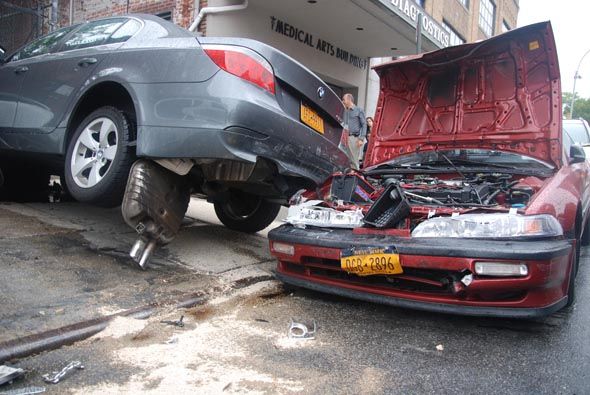Op-Ed: State Must Reform No-Fault Auto Insurance To Combat Fraud

While car insurance isn’t nearly as costly or vital as health coverage, it is, nonetheless, compulsory in New York State if you own and/or operate a motor vehicle. Brooklyn has the third highest car insurance rates in the nation, apparently for one reason — insurance fraud.
As reported on Sheepshead Bites last week, State Senator Marty Golden and the citizen consumer group New Yorkers Stand Against Insurance Fraud (NYSAIF) asked the state legislature to once again tackle auto insurance reform in 2012.
In its last session, the legislature failed to pass a measure aimed at combating auto insurance fraud, which is reportedly one of New York’s fastest growing crimes. According to NYSAIF, fraud has cost more than one billion dollars over the last several years and resulted in New Yorkers paying more than 50 percent higher insurance rates than drivers in other states. It may also be why you can spot an inordinate number of motor vehicles in our community with Pennsylvania plates, where the rates are cheaper. Nevertheless, that may be fraudulent, too, if someone uses a Keystone State address of a friend or relative and does not actually live there for at least six months in any year.
The most recent State Insurance Department data indicates the highest state fraud rates are in Brooklyn and The Bronx, which, of course, sustains the high cost of car insurance.
NYSAIF maintains that “organized enterprises” stage accidents and, with the help of body shops and crooked doctors, run up phony bills and unnecessary medical expenses that artificially drive up insurance rates. Companies may not have an adequate workforce to thoroughly investigate every claim, so if they pay off undetected scams by con artists, under New York’s “no fault” law, insurance companies tend to jack up rates for everyone. Subsequently, the innocent are punished along with the guilty consumers.
Fraud may involve auto repair shops and mechanics that bill for work never done or parts never used. It may also involve individuals in crashes or thefts who claim the loss of more property than was actually in a stolen or damaged car, or charge for repairs and/or damage that was not as a result of the latest mishap. Then there are sham injury claims by passengers, not to mention fraudulent bills submitted by dishonest medical providers. There’s also what’s known as a “paper claim,” which involves an accident that never actually happened and is reported with a falsified statement.
Consequently, Brooklyn vehicle owners pay hundreds of dollars more annually on their premiums while auto fraud professionals are profiting from accidents. Money paid by insurance companies for fraudulent insurance claim adds to its annual losses, a statistic that is largely used to determine future rates.
Clever consumers should shop around for the lowest auto insurance available, but, in Brooklyn, there’s not much chance that even a driver with a spotless record is going to find anything that isn’t out of proportion compared to what relatives and friends pay elsewhere.
For years, a few state and federal legislators have talked about cracking down on the car insurance fraud problem, but nothing has been done. Whether or not that ever becomes law may depend on the car insurance lobby’s powerful influence with lawmakers.
In 2010, senior U.S. Senator Charles Schumer introduced legislation that vowed “to tackle the problem head on.” His proposal called for stricter federal penalties for criminals — the participants, organizers and masterminds — involved in auto insurance fraud, including making them responsible for all costs tied to a scam. However, Congress has failed to address the issue thus far.
There’s little doubt that auto insurance companies are being swindled, but when those criminal activities are confirmed, punish the guilty, instead of the law abiding citizens who obey the rules, yet are stuck with paying higher rates for something over which they have no control.
If insurance companies put as much effort and funding into exposing those who rip them off as they do into relentless advertising campaigns, they could perhaps reduce fraud, still earn decent profits and keep rates more reasonable — even for car owners in Brooklyn.
All the same, state lawmakers can help reduce the costs that make New York the auto insurance fraud capital of America. They have to wake up and smell the scams and create legislation to restructure no-fault insurance, which would go a long way to cracking down on fraud.
Neil S. Friedman is a veteran reporter and photographer, and spent the last 15 years as a features editor at Canarsie Courier. Aside from reporting, he did public relations work for brands including Showtime, The Rolling Stones and Michael Jackson. Friedman contributes occasional columns on life, culture and politics in Sheepshead Bay.



